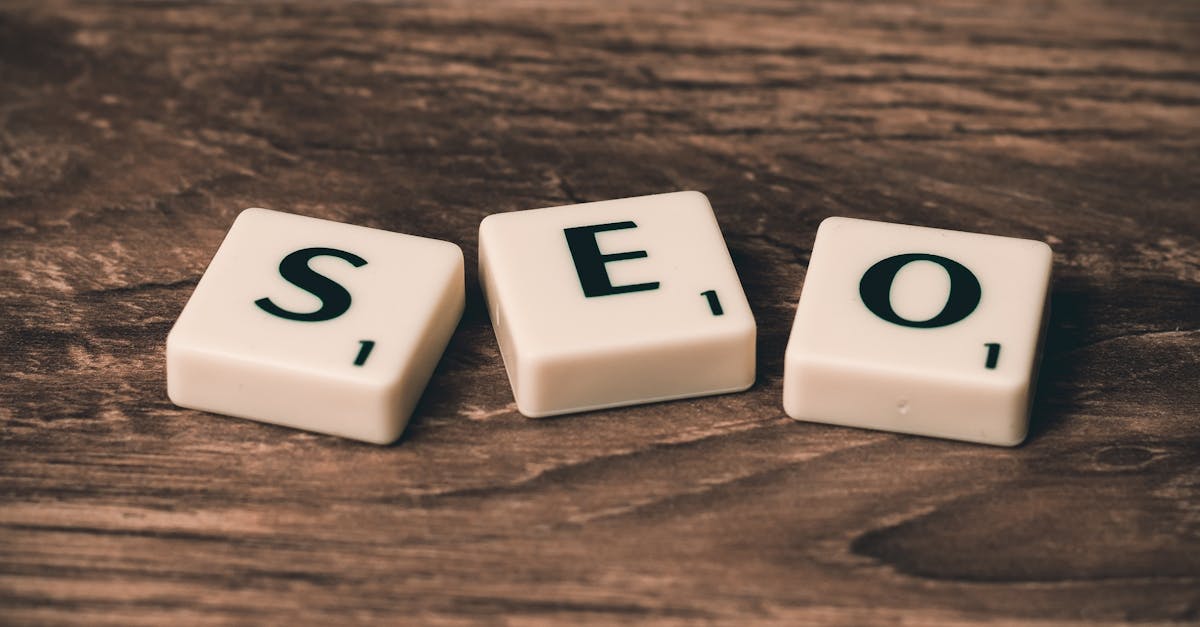
Table Of Contents
The Role of Industry in SEO Pricing
Different industries experience varying levels of demand for SEO services, which directly influences pricing. For instance, sectors with high competition, like e-commerce or travel, often necessitate more intricate strategies, resulting in higher costs for SEO engagement. Additionally, industries focused on local markets might require tailored approaches, such as Local SEO. This involves optimising for specific geographic areas, which can add to the overall investment while ensuring businesses effectively reach their target customers.
Specialised industries may have unique challenges that affect SEO pricing. For example, businesses in the healthcare sector often face strict regulations and require highly accurate information, leading to more extensive keyword research and content development. This complexity can increase the costs associated with maintaining an effective SEO strategy. Therefore, understanding the nuances of an industry's demands can help business owners assess the potential costs of SEO services and make informed decisions.
How Competition Affects Costs
The level of competition within a particular market significantly influences the costs associated with SEO services. In industries where many businesses vie for visibility, such as retail or hospitality, achieving high search engine rankings can require more resources. This often translates to higher costs for small businesses aiming to implement effective Local SEO strategies. Companies may need to invest in advanced techniques, tools, and professional services that can help them stand out amid a crowded digital landscape.
Conversely, niche markets with less competition may see lower SEO costs. In these scenarios, businesses might achieve their desired online presence more quickly and affordably. However, even in less competitive fields, Local SEO remains a critical component as local search behaviour continues to grow. To tap into potential customers and engage with the community, even small businesses in niche segments must allocate sufficient resources to maintain their local visibility.
Evaluating the Value of SEO Services
Small businesses often find it challenging to assess the value of SEO services. However, understanding the potential benefits can illuminate the return on investment. Local SEO plays a crucial role in helping businesses connect with nearby customers. By optimising for local search, companies can significantly increase visibility within their communities, enhancing foot traffic and online engagement. The impact of this targeted approach frequently leads to higher conversion rates, as local consumers are more likely to purchase from businesses that appear at the top of search results.
The effectiveness of SEO services can be evaluated by examining key performance indicators such as organic traffic growth, lead generation, and conversion rates. These metrics provide insights into how well an SEO strategy is performing. Local SEO specifically can elevate a business’s profile in geographic searches, potentially reducing the time and resources spent on broader digital marketing efforts. By focusing on metrics that matter, businesses can make informed decisions about their ongoing investments in SEO services, ultimately striving for strategies that yield tangible outcomes.
Measuring ROI from SEO Investments
Measuring the return on investment (ROI) from SEO initiatives is crucial for small businesses aiming to understand the value of their digital marketing efforts. Metrics such as organic traffic growth, improved page rankings, and conversion rates provide tangible insights into the effectiveness of SEO strategies. For companies focusing on Local SEO, tracking the increase in foot traffic or inquiries related to local search queries can highlight the direct impact of these efforts on the bottom line.
To effectively evaluate ROI, businesses should establish clear objectives from the outset. This might include tracking sales generated through website visits or calculating the cost per lead acquired through organic search. By employing tools to analyse user behaviour and conversion funnels, companies can gain a comprehensive view of how Local SEO contributes to overall business performance, enabling them to make informed decisions about future investments.
DIY SEO vs. Hiring Professionals
Many small business owners consider taking the DIY approach to SEO as a way to save on costs. By leveraging free resources and online tools, they can implement strategies tailored to their specific needs. This approach allows for flexibility in scheduling and the freedom to explore various techniques. However, mastering the nuances of Local SEO can be overwhelming for those without prior experience, often leading to missed opportunities and inefficiencies.
On the other hand, hiring professionals can provide a stronger foundation for a business’s online presence. SEO experts possess the knowledge and experience to develop effective strategies, particularly in Local SEO, which is crucial for targeting nearby customers. While the upfront costs may be higher, the potential for a greater return on investment is significant. A dedicated team can ensure that a business remains competitive in search rankings, providing peace of mind that key elements are managed efficiently and effectively.
CostBenefit Analysis of Each Approach
When considering whether to tackle SEO independently or hire professionals, a cost-benefit analysis can clarify the best approach for small businesses. DIY SEO often requires minimal upfront costs, appealing to budget-conscious owners. However, the time commitment can be significant, and the learning curve steep, particularly for complex strategies like Local SEO. Mistakes in implementation can lead to missed opportunities for visibility, which may negatively impact the overall effectiveness of marketing efforts.
On the other hand, enlisting professional SEO services may involve higher initial expenses. Yet, these experts bring invaluable experience and established strategies for maximising results, especially in competitive niches. A professional approach often includes tailored tactics for Local SEO that would otherwise require years of trial and error to master. Businesses may find that the return on investment from increased traffic and conversions outweighs the upfront costs associated with hiring skilled SEO practitioners.
FAQS
What factors influence the cost of SEO for small businesses?
The cost of SEO for small businesses is influenced by various factors including the industry, competition level, the scope of services required, and the experience of the SEO provider.
How does competition affect SEO pricing?
In highly competitive industries, SEO costs tend to be higher due to the increased effort and resources needed to achieve and maintain rankings. Conversely, businesses in less competitive niches may find more affordable SEO options.
What should I consider when evaluating the value of SEO services?
When evaluating the value of SEO services, consider factors such as the potential return on investment (ROI), the experience and track record of the SEO provider, and the specific services included in the package.
How can I measure the ROI from my SEO investments?
To measure ROI from SEO investments, track key performance indicators such as organic traffic growth, conversion rates, and revenue generated from organic leads. Comparing these metrics against your SEO costs will help you assess effectiveness.
Should I do SEO myself or hire a professional?
The decision to do SEO yourself or hire a professional depends on your expertise, available time, and budget. DIY SEO can save costs, but hiring professionals can often yield faster and more effective results, especially if you lack experience.

















































